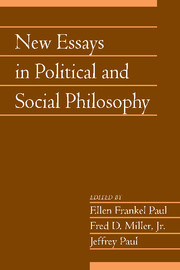Book contents
- Frontmatter
- Contents
- Introduction
- Acknowledgments
- Contributors
- Political Liberty: Who Needs It?
- State Coercion and Force
- Political Legitimacy and Economic Liberty
- Who Owns What? Some Reflections on the Foundation of Political Philosophy
- Human Reproductive Interests: Puzzles at the Periphery of the Property Paradigm
- Why Free Trade is Required by Justice
- Structural Exploitation
- Rescuing Justice from Equality
- Reinterpreting Rawls's The Law of Peoples
- Responsible Choices, Desert-Based Legal Institutions, and the Challenges of Contemporary Neuroscience
- Genocide and Crimes Against Humanity: Dispelling Some of the Conceptual Fog
- Harm and the Volenti Principle
- Education and the Modern State
- Index
Education and the Modern State
- Frontmatter
- Contents
- Introduction
- Acknowledgments
- Contributors
- Political Liberty: Who Needs It?
- State Coercion and Force
- Political Legitimacy and Economic Liberty
- Who Owns What? Some Reflections on the Foundation of Political Philosophy
- Human Reproductive Interests: Puzzles at the Periphery of the Property Paradigm
- Why Free Trade is Required by Justice
- Structural Exploitation
- Rescuing Justice from Equality
- Reinterpreting Rawls's The Law of Peoples
- Responsible Choices, Desert-Based Legal Institutions, and the Challenges of Contemporary Neuroscience
- Genocide and Crimes Against Humanity: Dispelling Some of the Conceptual Fog
- Harm and the Volenti Principle
- Education and the Modern State
- Index
Summary
Introduction: Listening to the Dead
One of the most extraordinary passages in modern literature is that presented to us by Ezra Pound as his First Canto. Indeed, as the start of what eventually became the very backbone of twentieth-century poetry (Pound's Cantos), strict chronology aside, there may be some argument for seeing his first canto as a kind of manifesto for what has come to be known as modernist literature, that which has come to be associated with the writings of T. S. Eliot, James Joyce, Ernest Hemingway, and Pound himself around the time of World War I. The manifesto suggests that we can only retrieve the wholeness our civilization has lost by re-connecting with our past, and thereby feeling things anew—the very opposite of what the modernists saw as the cliché-ridden and orotund poetry prevalent prior to World War I.
What Pound does in Canto I is to provide his own tensely archaic translation of a sixteenth-century Latin translation of part of Book XI of Homer's Odyssey. This book is the so-called Nekuia, the Book of the Dead—itself thought to be one of the earliest parts of the Odyssey. Already Pound is making a point. We see Homer (to the extent that we still do), as refracted through the lenses of twenty-five (or more) centuries of Homeric reading and study and thought. But the meaning deepens when we consider the context of the Nekuia.
- Type
- Chapter
- Information
- New Essays in Political and Social Philosophy , pp. 322 - 336Publisher: Cambridge University PressPrint publication year: 2013



